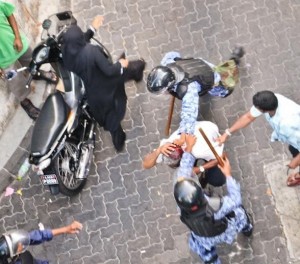The government will submit legislation on gender equality during the ongoing first session of the People’s Majlis for 2015, Attorney General (AG) Mohamed Anil has said.
Speaking at a function held at the Islamic Centre yesterday to mark International Women’s Day, AG Anil – who also heads the Ministry of Law and Gender – said the bill would protect women’s rights, empower women socially and economically, and ensure equal rights.
Anil said the government has undertaken significant efforts to promote women’s rights and “eliminate obstacles” faced by Maldivian women.
“Of the total 926 members of the Ministry of Economic Development’s Sabah project, I note happily that 91 percent are female members,” he said.
He added that 60 percent of the Ministry of Fisheries and Agriculture’s commercial loan scheme would be earmarked for women and youth.
The government has also formulated and enacted rules for operating daycare centres to assist working mothers, Anil said, adding that an amendment would be submitted to tax laws to exempt the centres from GST.
Efforts were currently underway to establish safe houses in each atoll for victims of domestic violence, he added.
Safe houses or temporary shelter have so far been set up at the Family and Children Service Centres in Haa Dhaal Kulhudhufushi, Shaviyani Fonadhoo, Thaa Veymandoo, and Gaaf Dhaal Thinadhoo, Anil noted.
Anil said there was no discrimination between boys and girls in the education sector, noting that 70 percent of graduates from the National University in March 2014 were female.
In its concluding observations released last Friday (March 6) on the combined fourth and fifth periodic reports of the Maldives, the UN Committee on the Elimination of Discrimination against Women welcomed legislative reforms such as the Sexual Harassment and Abuse Prevention Act of 2014, the Sexual Offences Act of 2014, the Prevention of Human Trafficking Act of 2013, and the Domestic Violence Prevention Act of 2012.
The Maldives acceded to the UN Convention on Elimination of Discrimination against Women (CEDAW) in July 1993
The committee also noted the establishment of the Family Protection Authority in 2012 and welcomed “forthcoming amendments to the Family Act to regulate the distribution of matrimonial assets upon divorce.”
In his presidential address at the opening of parliament earlier this month, President Yameen said the legislation would protect women’s rights in divorce cases as pledged during the presidential campaign.
The CEDAW committee meanwhile noted “that the principle of equality between women and men is not yet explicitly enshrined in legislation” and called on the state to ensure that the gender equality bill includes a definition of discrimination on the basis of sex.
The committee also expressed concern about “the delay in conducting a gender impact analysis of some of its existing laws, including family law provisions which continue to indirectly discriminate against women, and in adopting regulations necessary for the full implementation of the Domestic Violence Prevention Act and the Prevention of Human Trafficking Act.”
Insufficient progress
Meanwhile, in a press release yesterday, the Human Rights Commission of Maldives (HRCM) said the Maldives has not achieved or made adequate progress under the Millennium Development Goal of ensuring equal rights for women.
Referring to its shadow report to the CEDAW committee last year, the commission said it had noted the underrepresentation of women in decision-making as well as the minor role of women in economic development.
The report noted that some police officers believe violence against women was caused by women failing to fulfil their duty as submissive wives.
The HRCM also contended that women were not receiving full protection under the new domestic violence, sexual offences, and sexual harassment laws, noting that regulations required under the domestic violence law have yet to be enacted two years after it was passed.
“Despite domestic violence cases being reported, we note that that relevant state institutions are not taking action in accordance with the obligatory rules for such cases,” the HRCM press release stated.
The commission also stressed the importance of expediting the passage of the gender equality bill and appealed to the executive to allocate sufficient funds and resources for institutions responsible for protecting women’s rights.
“Awareness also needs to be raised among girls regarding their physical and reproductive health,” the press release continued.
“To achieve this, we appeal for both further widening the role of state institutions and civil society organisations and instilling the spirt of working together.”
The slogan for this year’s International Women’s Day is ‘Empowering Women – Empowering Humanity: Picture it!’
Related to this story
CEDAW committee welcomes progress on women’s rights, expresses concern with child marriages, flogging and gender stereotypes
Some police officers believe women to blame for domestic violence, says HRCM
Likes (3)Dislikes
(3)Dislikes (0)
(0) 
